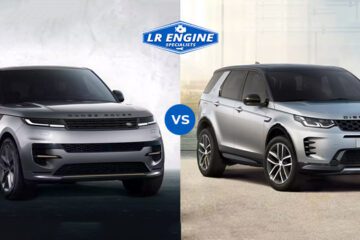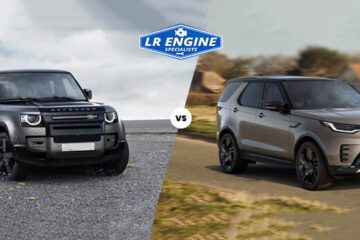Introduction:
Land Rover’s legendary lineup smoothly blends luxury with commendable off-road performance. Among its most iconic variants, the Range Rover Sport and Range Rover Defender stand out for their incredible capabilities off the beaten path. When handling the most challenging terrains, choosing the right engine is vital. This comparison of the Range Rover Sport engine vs the Range Rover Defender engine off-road capability emphasises the strengths of both petrol and diesel models, helping you determine the ultimate choice for the toughest off-roading.
Understanding Off-Road Demands: Power, Torque, and Terrain
Before discussing specs, it’s essential to define extreme off-roading. Unlike light trails or muddy fields, the toughest conditions include rock crawling, deep water wading, high-altitude ascents, dune bashing, and steep hill climbs. These environments need engines with high torque, responsive throttle control, adaptive suspension, reliable transmission, and exemplary thermal management.
Petrol and diesel engines work differently in such conditions. Petrol engines normally rev higher and respond immediately, while diesel engines generate more low-end torque, which is necessary for slow-speed crawling and towing. Therefore, contrasting the Range Rover Sport engine vs the Range Rover Defender engine off-road capability is more than about horsepower numbers, but real-world torque and drivability under pressure.
Range Rover Sport Petrol and Diesel Engines: Built for Performance
The Range Rover Sport offers a lineup of engines, but for this comparison, we will focus on the 3.0L inline-6 petrol and 3.0L inline-6 diesel models. Both come with mild-hybrid electric vehicle (MHEV) technology, boosting fuel efficiency and low-end performance.
The petrol variant produces approximately 395 horsepower and 550Nm of torque, while the diesel engine provides around 345 horsepower and 700Nm of torque. These numbers show that while the petrol version is more potent on paper, the diesel offers remarkably higher torque, especially at low RPMs, a vital factor in extreme off-road conditions.
The Range Rover Sport also has Terrain Response 2, the latest traction management system that automatically adjusts throttle, suspension, and drivetrain based on terrain. With adaptable air suspension delivering up to 274mm ground clearance, off-road articulation is perfect.
Range Rover Defender Petrol and Diesel Engines: Designed for Durability
The Range Rover Defender redefined Land Rover’s off-road heritage when it re-entered the market with the latest technology and classic ruggedness. Engine options reflect those of the Sport in some ways but are tuned differently. The 3.0L petrol engine in the Defender also provides 395 horsepower and 550Nm of torque, while the diesel version outputs 296 horsepower and 650Nm of torque. Meanwhile, the Defender’s engine calibration is built to prioritize torque output and extraordinary dependability.
In addition to incredible torque curves, the Defender comes with a low-range gearbox, permanent four-wheel drive, and greater wheel articulation, which are essential for technical trails and obstacle-heavy paths. While the Range Rover Sport petrol engine excels on high-speed trails, the Defender diesel engine dominates in slow, technical conditions due to its stable torque and ideal engine braking.
Engine Placement and Cooling in Off-Road Scenarios
One of the frequently ignored elements in the toughest off-roading is engine heat management. Maintaining proper engine temperature is essential when vehicles are climbing steep inclines under heavy loads. The Defender’s diesel engine cooling system is built with off-roading in mind, guaranteeing performance doesn’t drop in desert heat or humid jungles. The Range Rover Sport petrol engine, while efficient, is enhanced more for on-road performance with bursts of off-road capability.
This contrast is important when analyzing the Range Rover Sport engine vs the Range Rover Defender engine off-road capability in real-life expeditions. Compatible thermal performance, fuel economy under load, and throttle mapping all contribute to sustained off-road dominance.
Suspension and Drivetrain Synergy with Engine Behavior
An engine does not work alone. Its compatibility with the vehicle’s suspension and drivetrain is what determines actual performance. The Range Rover Defender’s suspension travel and wheel articulation pair ideally with the diesel engine’s low-end grunt. In comparison, the Range Rover Sport petrol engine prefers speed, throttle response, and effortless gear shifts, commanding in dunes or fast-moving trails, but not perfect for tight rock passages or steep declines.
This relationship becomes more noticeable when observing engine braking, crawl speed control, and how each variant interacts with differential locks. The Defender’s off-road settings enable precision torque delivery, whereas the Sport’s setup has improved sporty dynamics.
Fuel Economy and Range in the Wilderness
Fuel economy may not always be the main focus, but it directly impacts your range when going off the grid. In extreme off-roading, fuel stations are rare. Diesel engines naturally consume less and store better in the toughest environments. The Range Rover Defender diesel variant offers an ideal range, with some users reporting 700+ miles per tank in moderate off-road use.
The Range Rover Sport petrol engine, while exhilarating, burns faster, limiting range in expedition settings. In the rough outback or at high altitudes, the diesel’s fuel efficiency is not just a convenience; it’s necessary.
Off-Roading Technology Integration: Smart Systems Supporting the Engine
Both models have advanced driver aids, but the Defender has a slight edge in modular off-road combinations. Its ClearSight Ground View technology, paired with configurable Terrain Response and off-road navigation, improves driver confidence. These systems work exemplary when paired with the diesel engine’s predictability and grunt.
In comparison, while the Range Rover Sport petrol model offers hill descent control and adaptive off-road cruise, these features are perfectly suited for less technical conditions. When every inch of grip and torque counts, the Defender diesel system excels brighter.
Torque-to-Weight Ratio: Crucial Metric for Off-Road Performance
When discussing Range Rover Sport engine vs Range Rover Defender engine off-road capability, it’s vital to consider the torque-to-weight ratio. The Defender, despite being heavier in some designs, still manages to maintain a more favorable torque-to-weight ratio, specifically in diesel variants. This ratio is important for pulling weight uphill, traversing muddy bogs, or overcoming boulder fields.
The Sport petrol model, while lighter and faster, lacks this torque density in necessary off-road scenarios. Torque isn’t only about moving power, it’s about command, restraint, and climbing without wheelspin or slippage.
Engine Maintenance and Durability in Harsh Terrain
Extreme off-roading also tests how good engines tackle wear and tear. Diesel engines, especially those in the Defender line, have proven more reliable in extended rough usage. Their simpler combustion characteristics and powerful construction make them excellent for rough treatment.
Petrol engines, particularly high-performance ones like those in the Range Rover Sport, need more frequent tuning and are more sensitive to heat, altitude, and inconsistent fuel quality, all normal in remote off-road areas.
Verdict: Which Engine Wins for Extreme Off-Roading?
While comparing the Range Rover Sport engine vs the Range Rover Defender engine off-road capability, the answer relies on the terrain and off-roading style. For the adrenaline-seeker flying over dunes and handling loose gravel at high speeds, the Range Rover Sport petrol engine offers a thrilling experience.
However, for sustained, technical, and extreme off-road conditions, especially including rock crawling, deep mud, snow trails, and remote travel, the Range Rover Defender diesel engine is the ultimate choice. It offers the best blend of low-end torque, thermal reliability, fuel efficiency, and drivetrain combination.
Even if it’s steep alpine passes, rain-drenched jungle trails, or high-altitude mountain climbs, the Defender diesel engine rises above the rest, cementing its place as the ruler of serious off-road adventures.
Conclusion:
Opting for the right engine is more than about horsepower or brand loyalty, matching performance with purpose. As off-roading enthusiasts continue to push boundaries, choosing the proper powertrain becomes an essential decision. Even if you lean toward the speed of the Range Rover Sport petrol engine or the endurance of the Range Rover Defender diesel engine, the right choice guarantees your journey is both safe and memorable.
For expert guidance, diagnostics, upgrades, and actual insights into the Range Rover Sport engine vs the Range Rover Defender engine off-road capability, believe in LR Engine Specialists. With years of experience tuning and maintaining Land Rover vehicles, we help you make knowledgeable decisions backed by performance data and practical know-how.
FAQs:
Which engine is better for rock crawling and technical trails?
The Range Rover Defender diesel engine is perfect for rock crawling and technical trails due to its higher low-end torque, which offers ideal control at slow speeds.
Does the Range Rover Sport petrol engine tackle high-speed off-roading well?
Yes, the Range Rover Sport petrol engine surpasses high-speed off-roading, like dune bashing, due to its responsive throttle and fast-revving capabilities.
How does fuel efficiency compare between the Range Rover Sport and Defender for off-roading?
The Range Rover Defender diesel engine offers ideal fuel efficiency, making it more suitable for long-distance off-roading, while the petrol version in the Range Rover Sport consumes more fuel.
What is the main advantage of the Defender’s diesel engine for off-roading?
The Defender’s diesel engine provides superior low-end torque, which is vital for handling steep inclines, mud, and rough terrain, guaranteeing consistent performance.
Are the Range Rover Sport and Defender engines reliable for extreme off-roading?
Both engines are reliable, but the Defender’s diesel engine is more robust for prolonged off-road use, as it’s built to withstand the toughest conditions with minimal maintenance.


